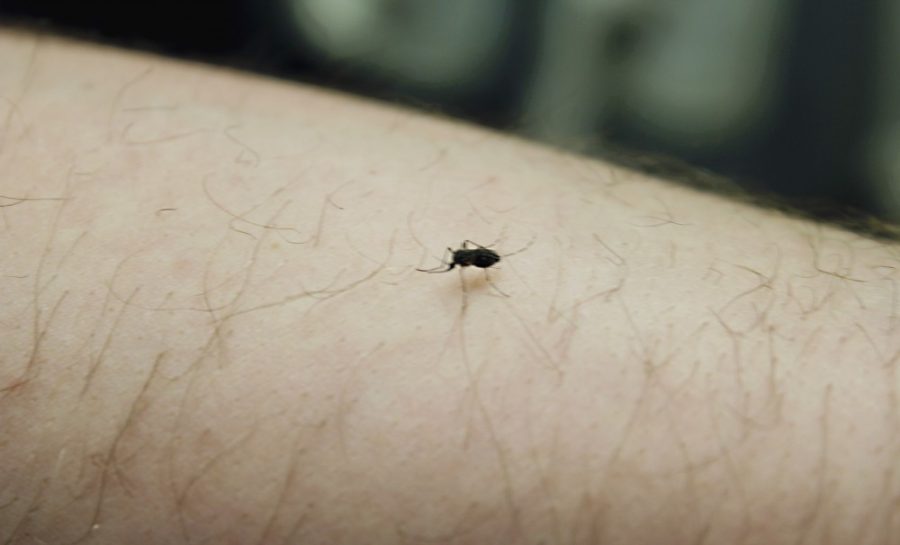Spray on your bug repellent.
September and November are when mosquitoes are the most active in Tucson — and with that comes the possible threat of West Nile virus.
Within the past couple of weeks, there have been three confirmed cases of West Nile virus in Pima County, according to a Pima County Health Department press release. Though the specifics of those cases cannot be revealed, symptoms of the individuals did vary and they were all adults, said Aaron Pacheco, a Pima County Health Department spokesman.
“Most people that get West Nile virus don’t know that they ever got it,” Pacheco said. “They’ll have no symptoms at all.”
Some people, however, may have symptoms such as a fever, headache, tiredness, and a skin rash or swelling of the lymph nodes, he said. The severity of the symptoms depends on the person.
“It’s worse in cases of people that have weakened immune systems,” Pacheco said.
People who have diabetes, heart disease, cancer or other health concerns are more susceptible to experiencing severe symptoms, he said. One out of 150 people who have West Nile virus will develop more serious diseases and could end up in the hospital, according to the press release.
A more serious case of the virus would be considered neuroinvasive.
“Neuroinvasive is when the infection and the inflammatory immune reaction enter the central nervous system,” Pacheco said.
In other words, the brain knows the infection has occurred. The damage can cause paralysis, confusion, poor motor skills or meningitis, which impairs the nerves of the brain tissue, he said.
The virus is transmitted to humans by mosquitoes that have bitten birds infected with West Nile, Pacheco said.
Entomologists at the UA have been working to genetically engineer mosquitoes that resist carrying other diseases carried by mosquitoes, such as malaria and yellow fever. Last year, entomologists created a mosquito that resists malaria. Other UA researchers have theorized that the mosquito population in the Southwestern United States will increase, due to higher projected temperatures, according to the National Science Foundation.
Mark Strass, an interdisciplinary studies senior, said mosquitoes have bitten pretty much everyone he knows recently, including himself. It’s normal since it has been wet outside, he said.
But Strass doesn’t worry about getting West Nile virus since he has lived in Arizona his whole life. He also said he had a friend who survived the virus.
“One of my friends’ cousins was in the hospital with West Nile (in Phoenix),” said Megan Mitchell, a sophomore studying journalism and marketing.
Though Mitchell hasn’t been bothered by mosquitoes lately, she said she gets “annoyed and paranoid” when she is bitten because she doesn’t want the virus.
“The mosquito is the only transmission line to humans,” Pacheco said. “The birds are the carriers but the mosquitoes can transmit it to other animals other than humans (such as horses).”
If someone has West Nile virus, getting rid of it is similar to having a cold or flu virus, Pacheco said.
“The body’s immune system fights the infection and then clears the virus from your body naturally,” he said.
About 80 percent of those who are infected with the virus do not show any symptoms, according to UA Risk Management Services.
Pacheco suggests people use mosquito repellent, especially if they are outdoors from dusk until dawn.
Another way to prevent mosquito bites is checking the backyard or around the house for standing water. Standing water in flowerpots or gutters should be removed or changed, Pacheco said.
“It keeps them from breeding, and when they’re breeding is when they’re most active,” he said. “By stopping them from breeding, you prevent them from being around you.”
Mitchell said she always puts food away, doesn’t leave standing water around the house and cleans regularly.
It’s also helpful to check screens on windows and doors to make sure there are no gaps, Pacheco said. People should also wear long sleeve shirts and pants whenever possible, he said.
“We tried to install one of those yellow (anti-bug) lights but it doesn’t really work,” Strass said.
Though there haven’t been any deaths associated with West Nile virus in Pima County this year, there have been deaths in Maricopa County. Last year, there were a total of 15 deaths in Arizona, according to the Centers for Disease Control and Prevention.









